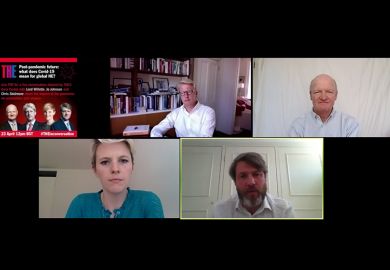Australia should double the post-study work entitlements for international undergraduates and business students, and foreigners studying for jobs in “key industries” should be encouraged to settle permanently, under recommendations from a Sydney thinktank.
Committee for Sydney CEO Gabriel Metcalf said that without urgent changes to student visa settings, “our most valuable services export” would lose ground to competitor countries. He said Australia should emulate Canada by immediately allowing overseas students to credit up to a year’s online study towards their eligibility requirements for post-study work visas.
Mr Metcalf said work rights for foreigners who completed Australian degrees should be set at four years, up from the two years currently available to international graduates of bachelor’s and taught master’s courses. He said the nation currently trained hundreds of thousands of people with links to 140 different countries and then required them to leave soon after graduation – a “foolish” approach for an export-oriented country.
“We should be encouraging students who study advanced degrees in Australia to stay here and contribute their knowledge, talent and global connections to local firms,” he said.
Under the proposal, graduates with continuous employment records in industries like advanced manufacturing, artificial intelligence, quantum technology and computer science would automatically be considered for permanent residency.
A US-born urban planner and former academic at the University of California, Berkeley, Mr Metcalf said Australia should take its cue from the US’ neighbour. “Canada has successfully been using recent uncertainty in the USA to poach tech firms and shift jobs north of the border,” he said. “It has now turned its attention to international students.”
The committee’s policy director, Eamon Waterford, said Canada had given foreign students a “rolled gold proclamation” that online study would count towards their post-study work rights. Australian immigration authorities determine such matters on a case-by-case basis.
“When we are dealing with 300,000 international students a year, a case-by-case basis feels time-consuming,” Mr Waterford said. “For students making a decision now about where they would like to study, [it] does not give them confidence or surety.”
He said Australian policy should be aimed at retaining valuable skills, citing UNSW Sydney’s claim to have educated much of China’s solar photovoltaic workforce: “What a damned shame that Australia didn’t retain some of those talented people in an industry that Australians should be excelling in! We’ve educated people because we’ve got the world-beating skills in that sector, and then let another economy take the benefit.
“And if we're not going to keep them in Australia, we [should] make those people feel welcome while they are here so that they have warm feelings towards Australia, and potentially build bilateral trade relationships over time.”
While work and study in Australia counts towards the “points” foreigners must accrue to secure skilled visas that allow them to settle permanently, Mr Waterford said graduates’ opportunities for residency had been reduced in recent years. He said the committee was not advocating a guarantee of permanent residency but more explicit pathways.
A decade ago, foreign university students exploited such pathways by shifting to short cooking and hairdressing certificate courses perceived as offering a migration advantage. Mr Waterford said “gaming” could be avoided by tying residency pathways not to short-term skill shortage areas, but “sectors that the government has identified as future industries for Australia’s growth”.
Register to continue
Why register?
- Registration is free and only takes a moment
- Once registered, you can read 3 articles a month
- Sign up for our newsletter
Subscribe
Or subscribe for unlimited access to:
- Unlimited access to news, views, insights & reviews
- Digital editions
- Digital access to THE’s university and college rankings analysis
Already registered or a current subscriber?










